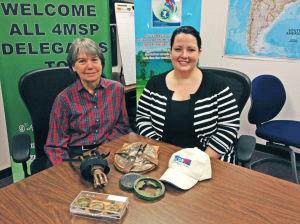Ammon News - THE News Virginian - Syrian refugees are pouring across the borders of other Middle East countries every month in the thousands, seeking to escape the bloodshed and turmoil of a civil war in their native country.
But fleeing does not come without risks. In addition to the winter cold, land mines and other explosive ordnance are in the desert paths of the refugees. The refugees could be killed making a getaway.
Leaders of a center based at James Madison University will spend time over the next several months helping train the refugees and their children about land mines and other ordnances by offering the center's expertise to Jordanian partner organizations.
The Center for International Stabilization and Recovery at JMU is providing the training with the help of a $388,442 grant from the U.S. Department of State.The center will work with one organization affiliated with the Jordanian government, and another group founded by a local land mine survivor.
Suzanne Fiederlein, the center's associate director, traveled to Jordan last week to start the training. She estimates there are currently 500,000 Syrian refugees in Jordan.
"We will train the adults about land mines and explosive ordnance,'' she said. And Fiederlein said the partner organizations and Syrians will learn about subtle clues of a potential explosion. She said "burned out cars" can be the source of such explosions.
Fiederlein said the center will also use awareness activities and art to train Syrian children about safety. "We will turn it (the artwork) into a picture that could convey the meaning,'' she said.
The work the center is doing can only help the Syrian refugees, said Jim Phillips, a senior research fellow for Middle Eastern Affairs at The Heritage Foundation in Washington, D.C.
"It's a nightmare situation,'' he said. He said the refugees "are being massacred by their own government.'' He said the Syrian government is using chemical weapons and artillery tanks.
"An effort like this could help them in their effort to survive,'' said Phillips of the refugees.
While Jordan has provided relief for the Syrians, Phillips describes the neighboring country as a poor one being stressed by the presence of the refugees. "There is a huge influx that is burdening Jordan. Jordan is one of the poorest Arab countries,'' Phillips said.
While refugees have been welcomed, they are seen by Jordanians as competitors for jobs and such vital but scarce resources as water, Phillips said.
The Center for International Stabilization and Recovery was founded in 1996 at JMU as the Mine Action Information Center. The name was changed to the current one in 2008. JMU Spokesman Eric Gorton said the center is part of the university's department of research and scholarshlp. Besides training, the center also provides research and information exchange to communities suffering conflict and trauma.
Over the years, Fiederlein said the center has performed similar work to that it is currently doing in Jordan in Vietnam, Colombia and Africa.
The first phase of training that ends this week will be followed by a return trip to Jordan in February, Fiederlein said. The training will continue through May of next year.
